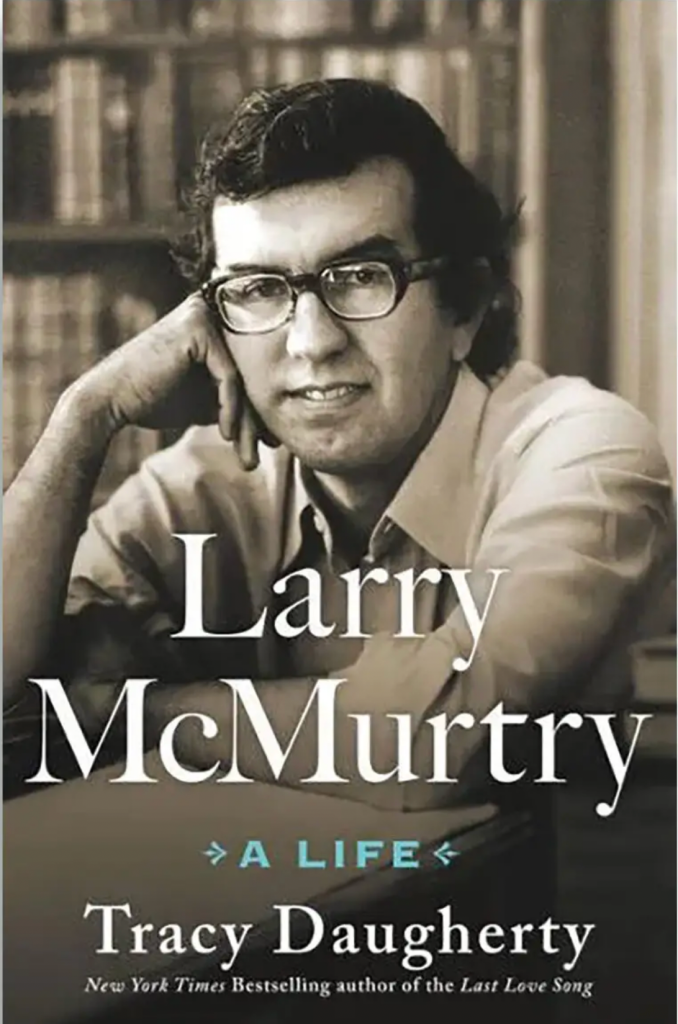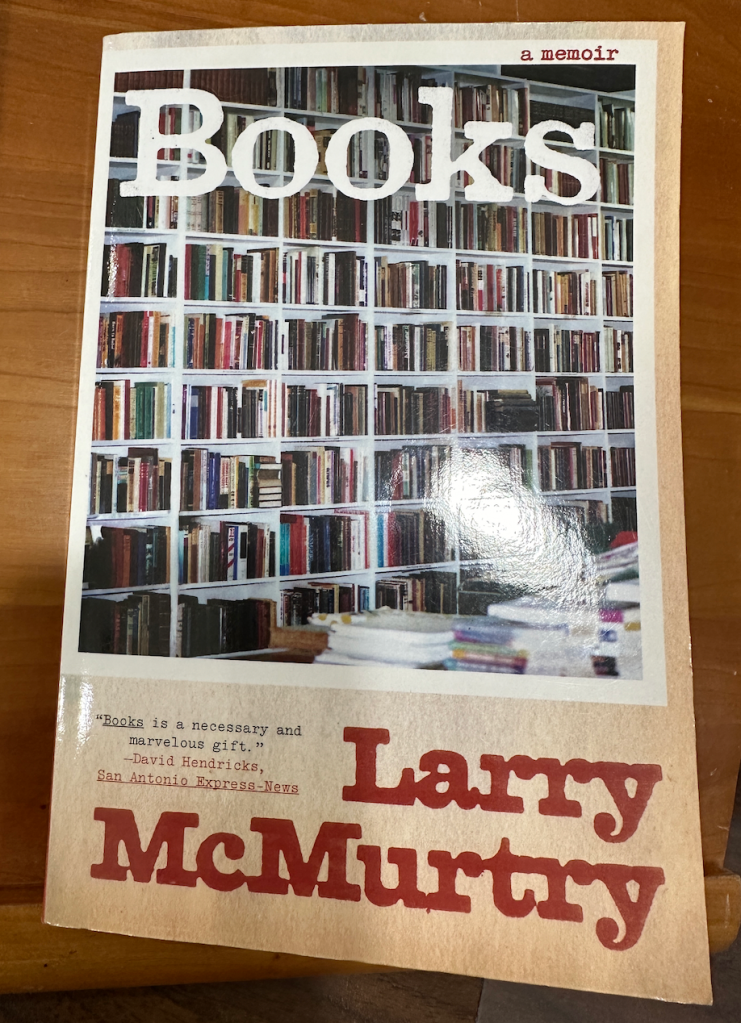
Tracy Daugherty’s Larry McMurtry: A Life (2023) is a terrific and evocative biography. As Dwight Garner says in The New York Times (source of the image), it’s “episodic” and “entertaining.” If, like me, you’ve only read a handful of McMurtry’s fiction and nonfiction (the Lonesome Dove books, The Last Picture Show, Texasville, Duane’s Depressed and some essay collections), Daugherty fills you in on what you’ve missed and also the books that he (and McMurtry himself) say you aren’t necessarily missing if you don’t read them.
This isn’t a “On June 20, 1963 he did such and so” kind of biography. Rather, through interviews, recollections by McMurtry, and knowledge of the spaces he inhabited, it gives you satisfyingly rounded impressions of–for lack of a better word–McMurtry’s general activities, headspace, and landscapes at various periods of his life: his career as a teacher, as a writer, and as a bookseller and book collector, the last of which seems to have been his real passion. It’s all interesting, from McMurtry’s early days in Texas through his friendships, fame, and bookstores. “Interesting” is sometimes a coolly neutral word, but it’s meant as praise here, for if you’ve ever read a biography that goes into exhaustive detail on the subject’s FBI files or chronicles a minute-by-minute and equally exhausting tale of the subject’s travels, you know that “interesting” isn’t guaranteed in a biography.
Daugherty discusses and seems largely to agree with McMurtry’s reputation as a novelist with a special talent for drawing women, a reputation he shares with John Updike. I’m puzzled by both of these, because McMurtry, like Updike, has two basic types of women in all the novels by him I’ve read:
- Somewhat spirited but downtrodden by circumstances, like Lorena in Lonesome Dove or Ruth Popper in The Last Picture Show (though not in Texasville, where she’s become a jogger, if memory serves, and learns to speak her mind).
- “Scary” women, like Lois Farrow in The Last Picture Show, Karla in Texasville, and Aurora in Terms of Endearment. These women are demanding, capricious, sometimes funny, and sometimes mean as snakes–and yet the men in the novels adore them for it and seem to enjoy their antics. They bring the drama, and the men eat it up, but why? Is it because the men around them are so taciturn and the culture so unforgiving that being mean as snakes is the only way the scary women can get their way and make themselves heard? Maybe it’s a cultural dance like the one that Rosemary Daniell describes in Fatal Flowers, where Southern men seem to adore and indulge the crazy in Southern women (I’m going from Daniell’s book, not my own perceptions) because they know the women have so little power otherwise. In Peter Bogdanovich’s superb movie version of The Last Picture Show, Lois tells Jacy that she’s not scary enough to bully Duane into being a success as she has scared Jacy’s father into being a success, so maybe “scary” is for McMurtry’s women the only route out of being downtrodden.
Reading Daugherty led me to ordering and reading McMurtry’s Books: A Memoir (2008); I’d read Walter Benjamin at the Dairy Queen some years ago. Books: A Memoir is McMurtry’s life as a reader and bookseller, told in 109 short vignettes. The New York Times review by James Campbell faulted this approach, saying that it’s more like notes to a memoir than a memoir.

But McMurtry was ahead of his time in this: think about Lauren Berlant and Kathleen Stewart’s The Hundreds or Maggie Smith’s You Could Make This Place Beautiful, both of which use the same form. Also, in our attention-challenged age, it’s a lot easier to read vignettes than long chapters. Because some phrases were repeated, I wondered whether these vignettes emerged from McMurtry’s famous morning writing routine as exercises to warm up as well as exercises in memory.
The writing routine: Daugherty tells us that McMurtry wrote on a Hermes 3000 typewriter, which McMurtry famously thanked in a 2006 Golden Globes acceptance speech for the screenplay of Brokeback Mountain (cowritten with Diana Ossana). McMurtry: “I wrote five pages a day for many years; then, as my fluency increased, I upped the pace to ten pages a day” (Books: A Memoir, 225). Daugherty adds this detail: after cataract surgery McMurtry continued his routine:
“McMurtry always felt that if he could capture the rhythm of a strong narrative voice, he could write as fast as he could type: the work was in his fingers and mind more than in his eyes. . . . He began at seven-thirty each morning. An hour and a half later, he’d be done.”